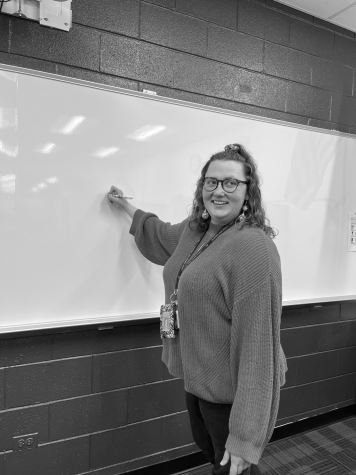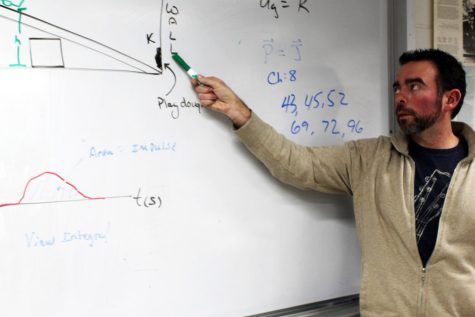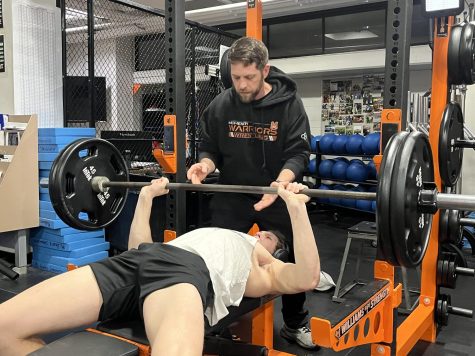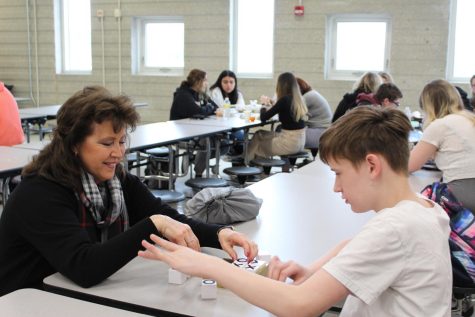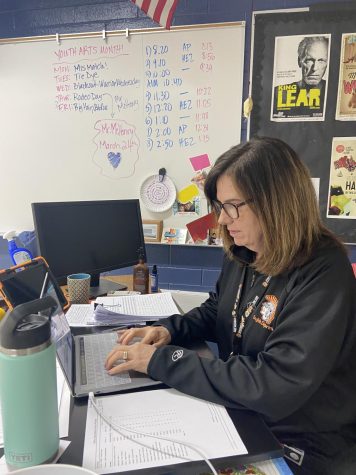Opinion: Common Core doesn’t set students up for success
Today’s Common Core system doesn’t allow students enough opportunities to explore their future career
Aaron Groleau
Working towards elective credit, students throughout MCHS adhere to Common Core standards.
December 27, 2020
A student sits in her school counselor’s office. She is planning out next year’s schedule, and sighs after her counselor shares the upsetting news. There’s no time for her to do homework after school because of her job, so she has to take a study hall. She chooses to take Spanish, since most colleges require foreign language experience. Her counselor explains that her schedule is full and she can’t choose any electives. Her heart sinks, as she had an eager plan of class choices ready. With more room in her schedule, she could’ve taken classes to prepare her for college, a career, or just a fun class, but she can’t. The Common Core classes such as science, math, language arts, and social science must come first.
Currently at McHenry Community High School, the graduation requirements state that students must take twenty four total credits. 3.5 of these will be physical education, 4 English (two of which being writing intensive), 3 Mathematics (one of which being Algebra I and one with geometry content), 2.5 Social Science with specifics per grade level, 3 Science (one of which being a life science course), 0.5 credit of Consumer Education, 0.5 of Health Education, and finally, 1 credit of a world language, fine art, or vocational education. All of this adds up to 19 required credits, leaving only 5 full credit opportunities in a student’s entire high school career for other chosen classes.
Many students will choose to take a world language each academic year, which would give them only 2 opportunities for elected, career focused classes (assuming that the student uses one year of language toward their fine art credit). Now, this does allow room in the day for a study hall each academic year. To sum it up, the only way for many students to take career specific courses is to take summer school each year or not elect to have a study hall. This does not allow enough opportunities for students to prepare for college or their career.
As mentioned earlier, the MCHS graduation requirements state 19 specific credits that all students must complete to graduate. These specifications do not allow enough time in a student’s schedule to take classes that will benefit them in their career. An anonymous MCHS student shares, “There are plenty of options for career focused classes, but there is not a lot of time to take them, especially when taking a language.” In a survey conducted on December 17th, 2020, 40% of MCHS students with a career cluster in mind are not taking any classes focused in that career cluster. Along with this, nearly 80% of students confessed that if there was more room in their schedule, they would take more career-focused classes.
Based upon these statistics, the issue is clear. There is not enough room in MCHS student schedules to take desired career-focused classes. These classes are the ones that prepare students for their future and provide them with the skills necessary to enter the workforce. Generalized science courses are not of much help to an aspiring actor, just like a history class won’t guide a biologist in their daily life. The classes students take should depend on their personal goals, needs, and aspirations, not the ones that are created for every other high school student in the country.
“Common Core is not necessarily the best, as it doesn’t focus on all types of learning that can be present within a classroom.” another MCHS student discloses. Common Core classes at MCHS include the mathematics, science, social science, and language arts programs, many of which are difficult and frustrating to students. More than 70% of students claim that they would be more successful in school if they took more career-focused classes.
An important aspect to consider about Common Core versus career-focused classes is student performance. An astounding 97% of students in career-focused classes confess that their grades are equal to or better than their grades in common core classes. At times, it can seem like Common Core classes are too specific or not useful, which is discouraging to students and their grades. Not only are career-focused classes more interesting and enjoyable, they are beneficial to student performance as well.
How can MCHS achieve such a drastic change to our high school experience? The most obvious strategy is to cut down on Common Core-style graduation requirements. Subjects such as mathematics, social science, language arts, and science become so specific and challenging as students progress through high school that they are only valuable to a specific career field. Many students feel that there are ample career-focused class options, but only for some career paths (specifically STEM). With the current campus changes, there would be no better time to add more career focused class options to West Campus and keep the freshman at East focused on the basics. It is important that students are given enough opportunities to experiment with career fields before attending college so they can discover what they enjoy. The current class requirements don’t do this for the students of MCHS.
The College and Career-Ready Standards state, “Federal law does not mandate a specific set of standards.” This means that it is up to the states and high schools to create their graduation requirements and educational standards. One way MCHS could accomplish more opportunities for career-focused classes would be through implementing a school-wide study hall time. This would allow many students who are currently using an elective time toward a study hall to choose more classes. Another option could be to add a school period to the day as an elective. Ultimately, there are multiple ways MCHS could implement more career focused classes and opportunities for MCHS students, an initiative that would please those taking the classes.
Many would argue that Common Core provides students with common, general knowledge that students need in their lives. I agree with this statement, however, they cannot prepare students for careers as well as career-focused classes can. There is an extent of knowledge and skills that are necessary and useful to students, but a lot of this is taught in elementary and middle school. Of course, many Common Core classes should still be required and offered, but nowhere near as many. An overwhelming 71% of students surveyed explained that they believe MCHS should move toward career-focused classes rather than Common Core. Multiple students also voiced the opinion that there should be more options now that can benefit students in their futures, while still receiving basic education. One anonymous student at MCHS discloses, “Career-focused classes are a great way to get kids who are not as excited about school or regular classes to learn more about things that they are interested in.” The goal of adding Common Core classes would be exactly this, expose students to new things and prepare others for their future careers.
Currently at MCHS, graduation requirements focus on basic, identical education to a variety of students with different needs and aspirations, and don’t provide them with enough opportunities to take desired classes. Career-focused classes offer students the opportunity to experiment with their talents and prepare them for their careers. Employers value success in general education, but more importantly, skills in specified areas. Changes to Common Core standards and graduation requirements could directly change the lives of MCHS students for the better. To encourage such changes, you can email the District 156 administration for West Campus and East Campus.













